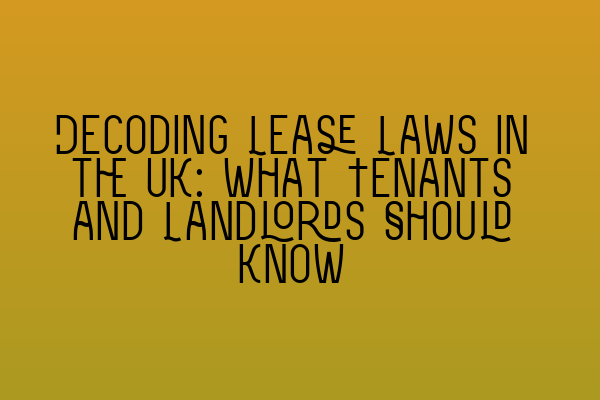Decoding Lease Laws in the UK: What Tenants and Landlords Should Know
Lease laws in the UK can be complex and overwhelming for both tenants and landlords. Understanding the rights and responsibilities associated with leasing a property is essential to ensure a smooth and mutually beneficial rental experience. In this article, we will decode the lease laws in the UK, providing valuable information for tenants and landlords alike.
1. What is a Lease?
A lease is a legal contract that outlines the terms and conditions of a rental agreement between a landlord and a tenant. It specifies the duration of the lease, the rent payable, and the rights and obligations of both parties. A well-drafted lease provides clarity, protects the interests of both the landlord and the tenant, and helps prevent disputes in the future.
2. Types of Leases
There are various types of leases in the UK, including assured shorthold tenancies (ASTs), regulated tenancies, and commercial leases. An AST is the most common type of lease for residential properties, typically lasting for a fixed term of 6 or 12 months. Regulated tenancies, on the other hand, have different rules and regulations, mainly relating to long-term tenancies established before 1989. Commercial leases govern the rental of commercial properties, such as retail units and office spaces.
3. Duration of the Lease
The duration of a lease can vary depending on the type of tenancy. ASTs are usually for a fixed term, after which they can either be renewed or terminated. Regulated tenancies can last for an indefinite period, providing security of tenure to tenants. Commercial leases, on the other hand, can range from a few years to decades, depending on the needs and preferences of both parties.
4. Rent and Rent Review
Rent is a critical aspect of any lease agreement. It is essential for tenants to understand the amount of rent payable and the frequency of payments. Landlords have the right to increase the rent periodically, usually through a rent review clause included in the lease. Rent reviews can be linked to inflation or market rates, and tenants should be aware of their rights in these situations.
5. Repairs and Maintenance
One of the key obligations of landlords is to maintain the property in a good state of repair. This includes ensuring the property is safe, structurally sound, and free from any hazards. Landlords are responsible for resolving issues related to repairs and maintenance, although tenants have a duty to report any defects promptly. It is crucial for tenants to understand their rights regarding repairs and communicate effectively with their landlords.
6. Deposit Protection
As part of a tenancy agreement, landlords usually require a security deposit from tenants. The deposit serves as a form of protection for the landlord in case of any damages or unpaid rent. In the UK, landlords are legally obligated to protect the tenant’s deposit in a government-approved deposit protection scheme. Tenants should ensure that their deposits are protected and understand the procedure for its return at the end of the tenancy.
7. Termination of the Lease
Both landlords and tenants have the right to terminate a lease agreement, although there are legal procedures that need to be followed. ASTs require a notice period of at least two months for termination by either the landlord or the tenant. Regulated tenancies have different rules, and tenants often have more protection and longer notice periods. Commercial leases typically have specific clauses concerning termination, which should be carefully reviewed and understood by both parties.
8. Seeking Professional Advice
Given the intricacies of lease laws in the UK, it is advisable for both tenants and landlords to seek professional legal advice to ensure compliance and protect their interests. Solicitors specializing in property law can provide valuable guidance throughout the lease process, from drafting the agreement to resolving any disputes that may arise.
In conclusion, understanding lease laws in the UK is essential for tenants and landlords to ensure a successful and harmonious rental experience. By familiarizing themselves with the key aspects discussed in this article, both parties can confidently navigate the complexities of lease agreements. For further information and resources regarding SQE preparation and exam dates, we recommend visiting the following links:
– SQE 1 Practice Exam Questions
– SQE 1 Practice Mocks FLK1 FLK2
– SQE 2 Preparation Courses
– SQE 1 Preparation Courses
– SRA SQE Exam Dates
Remember, knowledge is power, and being well-informed about lease laws can help tenants and landlords protect their rights and avoid potential difficulties in the future.
